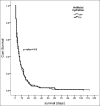Artificial Hydration at the end of Life in an Oncology Ward in Singapore
- PMID: 21218008
- PMCID: PMC3012241
- DOI: 10.4103/0973-1075.73668
Artificial Hydration at the end of Life in an Oncology Ward in Singapore
Abstract
Aim: The objective of this study has been to examine the frequency of use of artificial hydration in terminally ill cancer patients during the last 48 h of life and the occurrence of symptoms specific to hydration status. Other objectives were to find out if artificial hydration has any impact on survival or had any influence on the patterns of use of opioids and sedatives while under palliative care.
Materials and methods: Retrospective review of case notes of palliative care patients who died in a 95 bedded oncology ward was done. Information on demographic profile, duration of palliative care, medication use and on symptoms related to hydration status was collected. Patients on artificial hydration were compared to those who were not on artificial hydration for the above parameters. Survival curves were plotted for both groups using Kaplan-Meier method.
Results: There were 238 patients of which 55.5% were females. The median age was 62 years and the median duration of palliative care was five days. Artificial hydration was given to 59.2% of patients. There was no significant difference in the incidence of symptoms related to hydration status or in the patterns of medication use between patients who received artificial hydration and those who did not. Kaplan-Meier survival curves did not show any significant survival difference (P value=0.9) between the two groups.
Conclusion: Artificial hydration during the last 48 h of life did not have any significant impact on symptoms related to hydration status, medication use or on survival in terminally ill cancer patients under palliative care.
Keywords: Artificial hydration; supportive care; survival; terminal cancer.
Conflict of interest statement
References
-
- Bruera E, Franco JJ, Maltoni M, Watanabe S, Suarez-Almazor M. Changing pattern of agitated impaired mental status in patients with advanced cancer: Association with cognitive monitoring, hydration, and opioid rotation. J Pain Symptom Manage. 1995;10:287–91. - PubMed
-
- Bruera E, Sala R, Rico MA, Moyano J, Centeno C, Willey J, et al. Effects of parenteral hydration in terminally ill cancer patients: A preliminary study. J Clin Oncol. 2005;23:2366–71. - PubMed
-
- Burge FI. Dehydration symptoms of palliative care cancer patients. J Pain Symptom Manage. 1993;8:454–64. - PubMed
-
- Chiu TY, Hu WY, Chuang RB, Chen CY. Nutrition and hydration for terminal cancer patients in Taiwan. Support Care Cancer. 2002;10:630–6. - PubMed
-
- Dalal S, Bruera E. Dehydration in cancer patients: to treat or not to treat. J Support Oncol. 2004;2:467–9. 483. - PubMed
LinkOut - more resources
Full Text Sources


